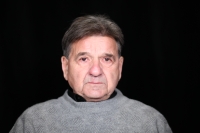In towns, people may have believed in socialism with a human face, but by no chance did those in the village

Stáhnout obrázek
Josef Slimáček was born on 7 December 1942 in Kelč to the family of František and Marie Slimáček as the third of six children. His father, a Sokol official, resisted joining the local united agricultural cooperative (JZD) in the first stage of collectivization. Therefore, was sent away from home for extraordinary military exercises and assigned to the PTP section. In his absence, the family property was confiscated. His father eventually fled, but returned home with poor health. He managed privately until the second stage of collectivization, when he succumbed to pressure and became the chairman of the collective farm. He resigned after three years. In 1968, based on the story of František Slimáček, a native of Vojtěch, a clear-cut film by Keleč, made the film All Good Natives. Joseph grew up on a family farm and liked ministering in the church. At the time of his father‘s military training, he and his brothers helped keep the farm running. After his father‘s return, the family found themselves without resources. Until František accepted the post of collective farm chairman during the second stage of collectivization, his family lived on his 200-crown pension. Josef started to work as a tractor driver after elementary school and, unlike his siblings who studied, he finished his secondary agricultural school only at work. In the end, he became the main agronomist of Kelč. He worked in Kelč until the end of 1988. Then he worked briefly in the military agricultural cooperative Libavá. After a revolutionary exchange following 1989, he tried to lead a collective farm in Kelč, but left soon. Until retirement, he worked as a shareholder in the Wallachian dairy. He still lives in Kelč and manages the family farm.
